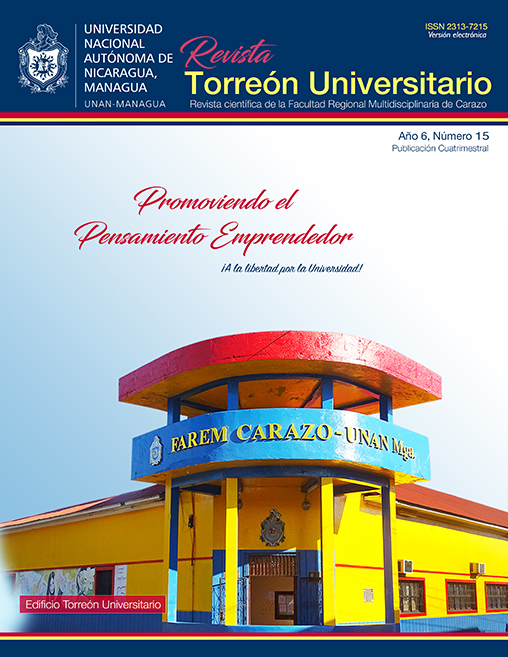Preparation and Interpretation of cartoons as a didactic strategy for the learning of Philosophy in Secondary Education
Abstract
This research paper was done at the State Public School Esquipulas in Managua, the group of students belongs to the Eleventh A and B grade, this paper consisted of the elaborating and interpreting cartoons with the purpose to transcend from a didactic memoristic model. This is based on the mental concepts reproduction to a pedagogical model, which allows the understanding of the contents and the development of the competencies such as: autonomy, critical thinking, reflexive and entrepreneur. To achieve this work the research team proceeded by using the socio-critical method and the research action, doing a didactic intervention of seven teaching classes of the philosophy contents of the middle age and Latin-American philosophy. The findings revealed that the students improve their learning on the contents; they significantly learned, and developed their autonomy and critical thinking; and they were more concern in the study of the philosophy subject at secondary school.
Downloads
References
Castro, F. (2000). ¿Por qué enseñar filosofía hoy? Revista de Teoría y Didáctica de las Ciencias Sociales, (005):147-156.
De Castilla, M. (2016). Aprender a Ser, para Aprender a Ser Autónomo. Disponible en: http://migueldecastilla.blogspot.com/search?updated-max=2016-10-06T08:56:00-07:00&max-results=7
Delors, J. et al (1996). La Educación Encierra un Tesoro. Unesco: Santillana.
Ferreiro, R. (2012). Cómo ser mejor maestro: el método ELI. (3ra. Ed.). México: Trillas.
Hernández, R., Fernández, C. y Baptista, M. (2010). Metodología de la Investigación. (5ta.Ed.). México: McGraw-Hill.
Kemmis, S. y Mctaggart, R. (1992). Cómo planificar la investigación acción. Barcelona: Laertes.
Latorre, A. (2007). Investigación acción. España: Graó.
López, G. (2012). Pensamiento crítico en el aula. Docencia e Investigación, (22):41-60.
Martínez González, R. (2007). La investigación en la práctica educativa: Guía metodológica de investigación para el diagnóstico y evaluación en los centros docentes. Madrid: CIDE.
Méndez, L. y González, M. (2011). Escala de Estrategias Docentes para Aprendizajes Significativos: diseño y evaluación de sus propiedades psicométricas.Revista Electrónica "Actualidades Investigativas en Educación", (3):1-39.
MINED. (2009). Currículo Nacional Básico: Diseño curricular del subsistema de la Educación Básica y Media nicaragüense.Managua, Nicaragua: Autor.
MINED. (2011). Programa de Estudio Educación Secundaria: Ciencias Sociales (Geografía, Economía, Sociología, Filosofía).Managua, Nicaragua.
Molina, M. y Rivas, K. (2011). La historia de los esclavos africanos en Mérida a través de caricaturas. Estrategias para el aprendizaje. EDUCERE, (15): 485-496.
Montoya, J. y Monsalve, J. (2009). Estrategias didácticas para fomentar el pensamiento crítico en el aula. Revista Virtual Universidad Católica del Norte, (25).
Orozco, J. (2016a). Estrategias Didácticas y aprendizaje de las Ciencias Sociales. Revista Científica de FAREM-Estelí. Medio ambiente, tecnología y desarrollo humano, (17):65-80
Orozco, J. (2016b). La Investigación Acción como herramienta para Formación Docente. Experiencia en la Carrera Ciencias Sociales de la Facultad de Ciencias de la Educación de la UNAN-Managua, Nicaragua. Revista Científica de FAREM-Estelí. Medio ambiente, tecnología y desarrollo humano, (19):5.17
Orozco, J. (2016c). La Didáctica de las Ciencias Sociales en la carrera Ciencias Sociales. Impacto en el desempeño de los docentes del área Ciencias Sociales de Managua.Tesis Doctoral. Juigalpa,Chontales: UNAN, FAREM-CHONTALES.
Páramo, A. (2011). ¿Tiene sentido la enseñanza de la Filosofía en el bachillerato? Revista digital educativa Wadi-red, (1):4-14.
Rossi, I. y O’Higgins, E. (1981). Teorías de la Cultura y Métodos Antropológicos. Barcelona: ANAGRAMA.
Downloads
Published
How to Cite
Issue
Section
License
Los autores que publican en esta revista están de acuerdo con los siguientes términos.
- El autor o los autores de los artículos, ensayos o investigaciones conceden a la Universidad Nacional Autónoma de Nicaragua, Managua (UNAN-Managua) los derechos de edición (copyright) del trabajo enviado, por consiguiente la Universidad cuenta con el derecho exclusivo para publicar el artículo durante el periodo completo de los derechos de autor.
- Estos derechos de autor/ autores autorizan a la Revista Torreón Universitario y a la Universidad editar y divulgar/publicar el artículo en dicha Revista, incluyendo reproducción impresa y electrónica, el almacenamiento, recuperación y cualquier otro tipo de publicación, y fuentes de información secundaria como servicios de resúmenes y bases de datos, así mismo la facultan a proteger el artículo contra el uso no autorizado para su difusión por medios impresos o electrónicos (PDF, HTML, EPUB, XML u otros).
Licencia para el uso del contenido
La revista hace uso de la Licencia Creative Commons Atribución-NoComercial-SinDerivar 4.0 Internacional.
Bajo esta declaración:

Este revista está sujeta a una licencia de Creative Commons Reconocimiento-NoComercial-SinObraDerivada 4.0 Internacional. Puede ser copiada, distribuida y transmitida públicamente siempre y cuando se cite al autor y la fuente (Revista Torreón Universitario), no debe modificarse ni utilizarse con ningún fin comercial. La licencia completa se puede consultar en http://creativecommons.org/licenses/by-nc-nd/4.0/.

